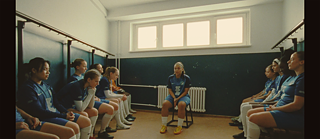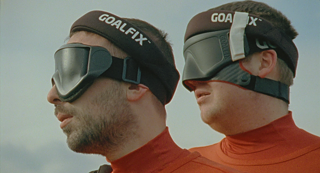Diversity in football
Tomorrow in the Present

Girls' teams, queer fan clubs, blind football teams: Football shows its integrative potential above all away from the big stage. The movie “Eleven Tomorrows” takes a look at eleven different football stories in Germany.
By Benedikt Maria Arnold
The football rattles. The goal clatters. The whistle shrills. And men wearing blindfolds yell “voy, voy, voy, voy, voy, voy”. This sonorous scene is how one of eleven short films in a compilation entitled “Eleven Tomorrows” kicks off. We see Jannick, a teenager who joins FC Ingolstadt 04 – a blind football team. His story is representative of the millions of football enthusiasts that the sport brings together.
This message is the leitmotif of the entire film, and the tone is set right from the start: “When I thought about football in the past, I thought of men yelling in stadiums and of Cristiano Ronaldo flying to Saudi Arabia in a private jet. Occasionally I also thought of women’s football. What I didn’t think about at all was that Germany is still a nation of football. That there is hardly any other country in the world that has so many football clubs.”
Amateur football in Germany doesn’t just have lots of clubs – the scene as a whole and the clubs themselves are also very diverse. And this is exactly what the short films in “Eleven Tomorrows” focus on. Forming part of the art and culture programme of the men’s 2024 European Football Championship, the compilation premiered at the Berlin International Film Festival in 2024. It portrays eleven football clubs and their players – on the pitch, in the changing room and in their everyday lives. The documentary portraits were filmed by students at the University of Television and Film Munich, eleven different aesthetic approaches that are linked at their core by one common element: football’s inclusive potential.
Football has always been political in Chemnitz – it’s just that it has always been very right wing,”
Member of the fan group Proletik Sonnenberg
In “Social Club” we are introduced to Proletik Sonnenberg, a community of fans of the Chemnitz football club Athletic Sonnenberg. We see young football enthusiasts who have teamed up not only to support their club but also to adopt an opposing stance in their city’s fan scene. “Football has always been political in Chemnitz – it’s just that it has always been very right wing,” explains a Proletik Sonnenberg member in the film. They campaign resolutely for tolerance, vehemently counter racism and provide a safe space for queer people.
The club SG Crostwitz also makes an important contribution to preserving diversity in the German football landscape. The club is situated at the heart of the area where Upper Sorbs settled in the east of Saxony. Alongside the Frisians, Danes and the Sinti and Roma people, the Sorbs are one of four recognized national minorities in Germany. They cultivate their own traditions and speak their own language; SG Crostwitz actively supports the use of the language, tirelessly combatting hostilities and promoting the continuation of their culture.

Blind footballers from FC Ingolstadt 04 listen to the sounds of orientation | Foto (Detail): © Internationale Filmfestspiele Berlin
Women’s football also features in “Eleven Tomorrows”. We meet the players of FFC Wacker Munich, ISC ALHILAL and Türkiyemspor Berlin and discover that team spirit, respect and mutual appreciation are not only preached but also practised.
The story of young Tymofii is a good example of how global events are reflected in football. Tymofii came to Germany in 2022 and joined the Hamburg football club KS Polonia. One day, we see him talking to his father on the phone after training. “I scored two goals,” he announces proudly while looking at his phone, on which his father can be seen – thousands of kilometres away at the front. Tymofii is one of 80 Ukrainian youngsters who now play for KS Polonia and as such are not only part of a football team but also part of a society.
A society whose strength lies precisely in the diversity that football is in a position to promote – and that’s what the film “Eleven Tomorrows” is keen to convey, inviting viewers to regard football as a space for encounters and exchange in which the boundaries between class, culture and religion are overcome and cohesion and togetherness are fostered.